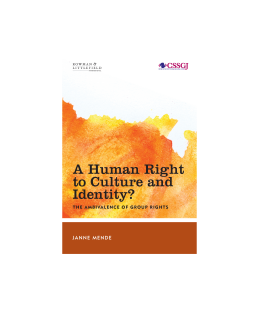
Additional Information
Book Details
Abstract
Is it desirable, or even necessary, to have distinct human rights for cultural identities? Do different conceptions of culture and identity, and their potential to frame human rights violations as culturally appropriate, complicate the question? How should a human right to collective identity be outlined?
Claims to human rights as applying to a whole (ethnic, religious or cultural) group, instead of the individual, prove to be complex. This book reveals the pitfalls, benefits and demands that surround the debate for and against culture and identity in human rights. It connects a continuous and nuanced theoretical debate with highly topical empirical findings about collective rights for indigenous groups, which for centuries have been suppressed and marginalized and now stand at the forefront of (successfully) demanding a human right to their own culture and distinct identity. This book shows the ambivalences of those demands and discusses solutions so that human rights neither exclude marginalized cultural groups nor reproduce rigid distinctions between seemingly exclusive cultures.
Culture is basically understood as the way of living for a group of people who have similar attributes and preferences. This book provides a useful guide to the background drivers and current practices on the subject. It not only covers the history of political thought but also provides a critical examination of political and social theories. It emphasizes the assumptions and ideas often used to explain roles and actions of society and government to define social and political aspirations about indigenous rights. It will be a good addition to the literature and serve as a good source of knowledge for students and scholars with an interest in cultural studies, sociology, social philosophy and global politics.
Saira Akhtar, Associate Professor of Sociology, University of Agriculture, Faisalabad
Janne Mende is a post-doctoral researcher at the University of Kassel. She has taught at the universities of Giessen, Berlin and Kassel. From 2010 to 2013, she conducted her PhD research, which was funded by Deutsche Forschungsgesellschaft (DFG). In 2011, she published a book in German on universalism, cultural relativism and female genital mutilation/cutting. She was a visiting research fellow at the Centre for the Study of Social and Global Justice, School of Politics and International Relations, University of Nottingham and a visiting scholar at the Department of Politics, New School for Social Research, New York.
A thoughtful reflection on a key topic of our time. Mende moves the debate to an alternative terrain, transcending classical associations of concepts of culture and identity and exploring the repressive and emancipatory dimensions of those terms. An enlightening read that combines theoretical discussions and empirical analysis.
Nieves Zuniga, Research Fellow in Politics, University of Nottingham
Table of Contents
| Section Title | Page | Action | Price |
|---|---|---|---|
| Contents | 7 | ||
| Tables | 9 | ||
| Abbreviations | 11 | ||
| Introduction | 13 | ||
| Part I: Decisive Approaches to Collective Rights, Culture, and Identity | 27 | ||
| Chapter One: Liberalism and Communitarianism | 31 | ||
| Part II: Rethinking the Key Themes | 59 | ||
| Chapter Two: Society and Culture | 61 | ||
| Chapter Three: Identity | 75 | ||
| Part III: Indigenous Human Rights | 99 | ||
| Chapter Four: Indigenous Rights in History and the Present | 101 | ||
| Chapter Five: Indigenous Demands in the United Nations | 119 | ||
| Chapter Six: Indigenous Rights | 159 | ||
| Conclusion | 173 | ||
| Appendix | 189 | ||
| References | 199 | ||
| Index | 217 |
